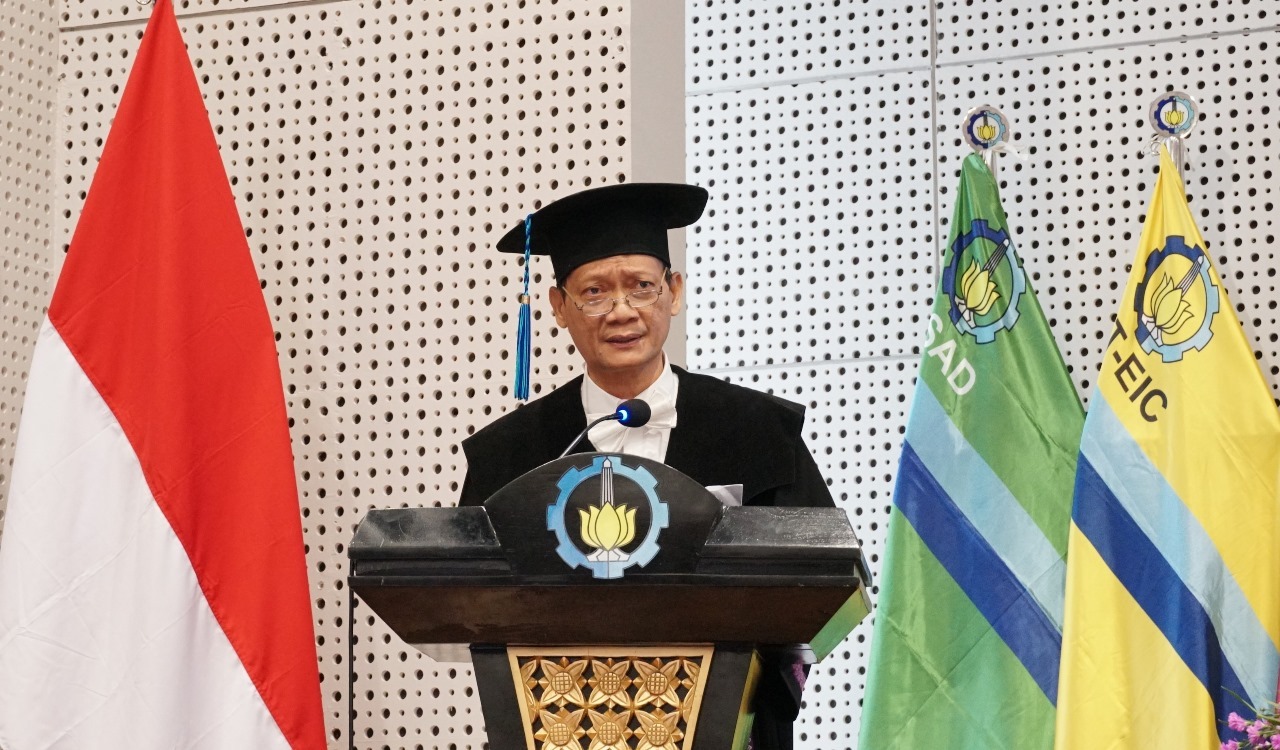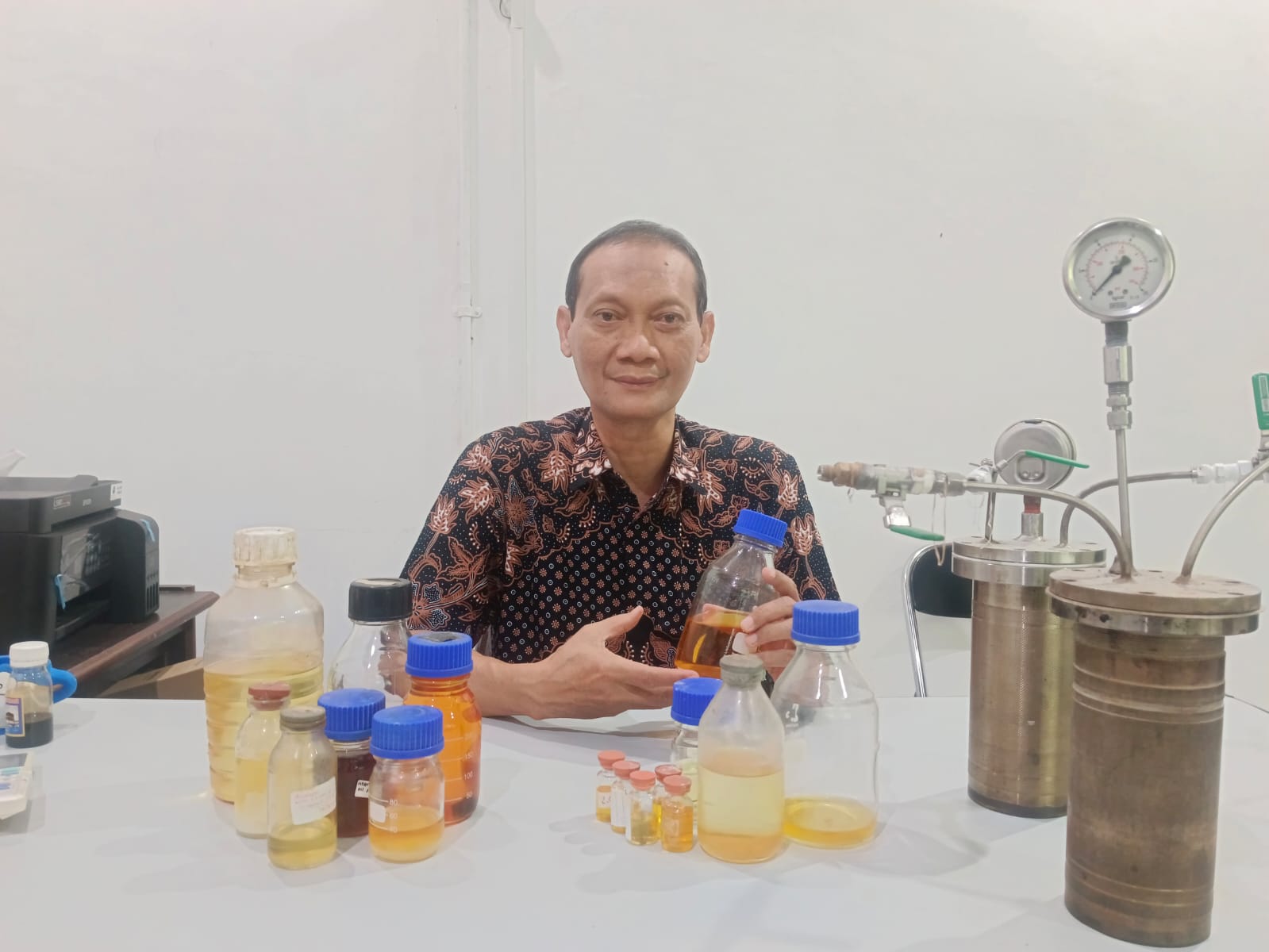ITS Professor Successfully Blends Biomass and Plastic into Biofuel

Prof Dr Hendro Junowo MSi, while presenting his scientific oration at the ITS Professor Inauguration Open Session
ITS Campus, ITS News — The increasing amount of plastic used in society creates its own environmental problems. To overcome this, the 212th Professor of Institut Teknologi Sepuluh Nopember (ITS), Prof Dr Hendro Juwono MSi, researched plastic degradation with biomass into biofuel as a solution to environmental and energy problems.
The ITS Faculty of Science and Data Analytics (FSAD) professor, who focuses on polymers and plastic degradation, explained that polymer sources are divided into natural and synthetic polymers. Natural polymers have properties that are easily degraded and decomposed back into nature. “Natural polymers are rubber, protein, flour, and collagen,” he said.
In contrast to natural polymers, synthetic polymers are difficult to degrade and decompose back into nature. Examples of synthetic polymers are polyethylene, polypropylene, and polystyrene, raw materials for plastics. Plastic is a derivative of non-renewable materials because the compounds in plastics have similarities with fuel compounds, such as petroleum and gas.

Prof Dr Hendro Juwono MSi, while showing the results of his research and the tools used for his research
Seeing this, the ITS Department of Chemistry professor researched using the pyrolysis method on plastic polymers that are easily degraded. In his research, the processed plastic was tested, and it showed that the Research Octane Number (RON) reached a value of 98 to 102. “The RON number that appears shows better quality than the fuel currently circulating in the community,” he explained.
Although the RON number shows good quality, there are still shortcomings. To make plastic waste into gasoline, a temperature of 400 degrees Celsius is required, which requires a large amount of electricity. Meanwhile, biomass such as tamanu oil, Crude Palm Oil (CPO), and Waste Cooking Oil (WCO) only require a temperature of 250 degrees Celsius.
Hendro mixes tamanu biomass, WCO, and CPO with plastic waste to save process costs. When tamanu biomass, CPO, and WCO are combined with plastic waste, the temperature required in the process is only 300 degrees Celsius. In addition to saving significant expenses, the materials needed are cheaper and easier to obtain.
Through a series of research for scientific oration in his inauguration as ITS Professor, Hendro said that his research helped achieve Sustainable Development Goals (SDGs) points 7 and 12. He hopes that his research can help solve environmental and energy problems. “This research requires patience and a long time,” he concluded. (ITS Public Relation)
Reporter: Muhammad Rafi Ardiansyah
Translator: Lael Soebakir
Related News
-
ITS Lecturer Introduces Madurese Culture to the International Stage
ITS Campus, ITS News — Continuing to show local wisdom to the world community, this time a lecturer from the Department
March 07, 2025 16:03 -
ITS Researchers Remind TKDN is Crucial for Economic Independence
ITS Campus, ITS News — The Domestic Component Level (TKDN) is the key to restoring the glory of the Indonesian
March 07, 2025 16:03 -
Strengthening Quality Education, ITS Professor Develops Adaptive Technology for Students
ITS Campus, ITS News — Differences in students’ abilities in understanding lessons are often a challenge for teachers in the classroom.
March 07, 2025 16:03 -
ITS Graduates Create Reverse Logistics Model for PET Plastic Waste Recycling
ITS Campus, ITS News — Doctoral graduate from the Department of Industrial and Systems Engineering, Sepuluh Nopember Institute of Technology (ITS) Dr. Yuniar
March 07, 2025 16:03
